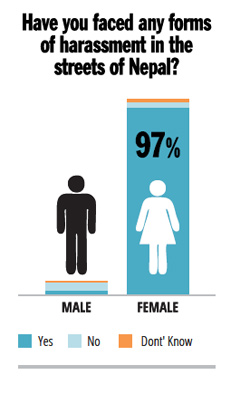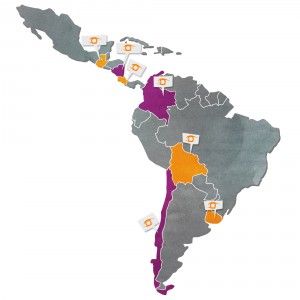Here are four notable news stories from the past day:
DECREE:
In Timbío, Colombia, a non-binding decree was made on November 25, 2016, to ban public-sector workers and contractors from making “lewd, coarse catcalling that offends ladies.” Those in violation will face verbal reprimand, sensitivity training, or counseling.
Along with the decree was the launch of a city-wide campaign against street harassment, including ads at harassment hotspots, like public transit and stadiums.
 The decree is supported by la Casa de Mujer, a local women’s organization.
The decree is supported by la Casa de Mujer, a local women’s organization.
SURVEY:
More than 1000 people took the #IWalkFreely survey in Nepal and 98 percent of all women said they had been harassed. Besides the streets, 71 percent of respondents also reported harassment in public transportation, 63 percent said they were subjected to physical harassment of some form, and 20 percent reported sexual harassment. Nearly half the participants who said they had faced harassment were between 20-29 years old, and 41 percent were between 13 and 19.
DOCUMENTING:
Here are two efforts to show what street harassment is like globally.
“As part of the BBC’s 100 Women season we would like you to join in and help us build up a picture of street harassment around the world.
We would like you or any of your female friends or family who experience harassment between Friday 2 December and Sunday 4 December to share your story with us.
We only need a brief description of the incident and the city where it happened. Tweet it using the hashtag #mappingharassment or if you prefer, email bbc100.women@bbc.co.uk
Do not put yourself at risk or try to take any pictures of the incident. Also do not give us further elements that could lead to your full identification, like your name, or address. Only post a brief description, the city and the hashtag.”
“As a woman walking around the city alone at night, there’s not much you can do if some creep decides to follow you around and harass you. But many women try to find a way to deal with feeling unsafe – to project an aura that will stop the harassment from happening. A brisk and confident step, eyes on the pavement and a hand in the pocket of your coat, clutching your phone.
To see how women from different countries in Europe deal with street harassment, VICE offices across the continent asked women from 13 cities if and where they feel unsafe alone at night, and how they deal with that feeling.” Read more.


